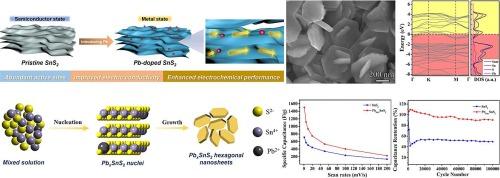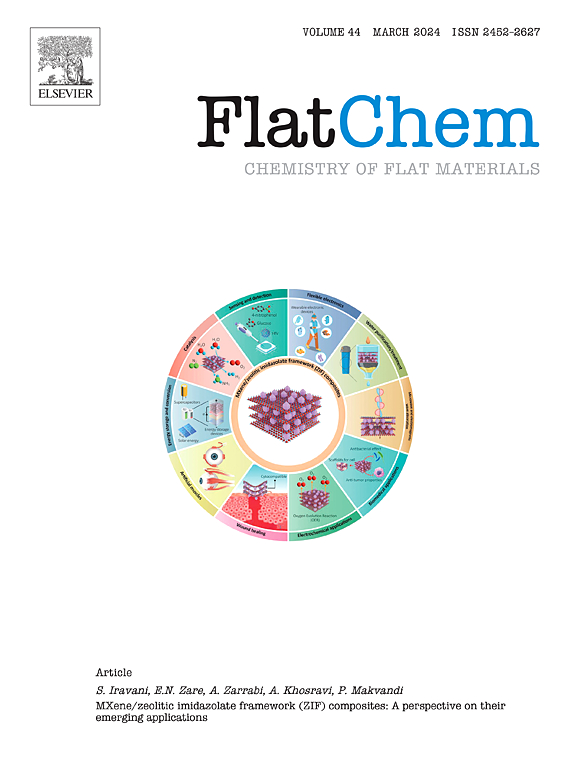通过掺杂微量铅提高 SnS2 的超级电容性能
IF 6.2
3区 材料科学
Q2 CHEMISTRY, PHYSICAL
引用次数: 0
摘要
高性能电极材料对于提高超级电容器的性能至关重要。在各种候选材料中,赝电容 SnS2 因其高比电容、富集性、无毒性和低成本而很有前途。然而,由于其内在电导率较低,其实际电化学性能受到限制,而且目前提高电导率的制造工艺通常比较复杂。本研究在第一原理计算的基础上,引入了掺杂铅来提高 SnS2 的导电性。掺杂铅的 SnS2 纳米片是通过简单的一步水热法合成的。与原始 SnS2 相比,掺杂痕量 Pb(Pbo.o1SnS2)后的电导率提高了 4 个数量级,令人印象深刻。此外,掺杂铅的 SnS2 纳米片在 50 mV s-1 的条件下显示出 533.7 F g-1 的优异质量比电容,在 5 A g-1 的条件下,经过 100,000 次循环,电容保持率达到 90.2%。这项研究提出了一种简单有效的方法来提高 SnS2 的超级电容器性能,并推动了基于二维材料的电化学储能器件的实际应用。本文章由计算机程序翻译,如有差异,请以英文原文为准。

Boosting supercapacitive performance of SnS2 via trace Pb doping
High-performance electrode materials are crucial for enhancing the performance of supercapacitors. Among various candidates, pseudo-capacitive SnS2 is a promising one due to its high specific capacitance, earth-abundance, nontoxicity as well as low-cost. However, its actual electrochemical performance is restricted owing to the poor intrinsic conductivity and current fabrication processes on improving the conductivity are usually complicated. In this study, based on first-principles calculations, Pb doping is introduced to enhance the conductivity of SnS2. Pb-doped SnS2 nanosheets are synthesized via a simple one-step hydrothermal method. With trace Pb doping (Pbo.o1SnS2), an impressive 4-order-of-magnitude increase in conductivity was achieved compared to pristine SnS2. Furthermore, Pb-doped SnS2 nanosheets exhibit a superior mass-specific capacitance of 533.7 F g−1 at 50 mV s−1 and excellent long-term capacitance retention of 90.2 % over 100,000 cycles at 5 A g−1. This study presents a simple and effective approach to enhancing the supercapacitor performance of SnS2 and advances the practical applications of electrochemical energy storage devices based on 2D materials.
求助全文
通过发布文献求助,成功后即可免费获取论文全文。
去求助
来源期刊

FlatChem
Multiple-
CiteScore
8.40
自引率
6.50%
发文量
104
审稿时长
26 days
期刊介绍:
FlatChem - Chemistry of Flat Materials, a new voice in the community, publishes original and significant, cutting-edge research related to the chemistry of graphene and related 2D & layered materials. The overall aim of the journal is to combine the chemistry and applications of these materials, where the submission of communications, full papers, and concepts should contain chemistry in a materials context, which can be both experimental and/or theoretical. In addition to original research articles, FlatChem also offers reviews, minireviews, highlights and perspectives on the future of this research area with the scientific leaders in fields related to Flat Materials. Topics of interest include, but are not limited to, the following: -Design, synthesis, applications and investigation of graphene, graphene related materials and other 2D & layered materials (for example Silicene, Germanene, Phosphorene, MXenes, Boron nitride, Transition metal dichalcogenides) -Characterization of these materials using all forms of spectroscopy and microscopy techniques -Chemical modification or functionalization and dispersion of these materials, as well as interactions with other materials -Exploring the surface chemistry of these materials for applications in: Sensors or detectors in electrochemical/Lab on a Chip devices, Composite materials, Membranes, Environment technology, Catalysis for energy storage and conversion (for example fuel cells, supercapacitors, batteries, hydrogen storage), Biomedical technology (drug delivery, biosensing, bioimaging)
 求助内容:
求助内容: 应助结果提醒方式:
应助结果提醒方式:


